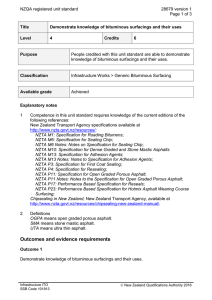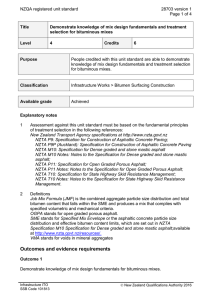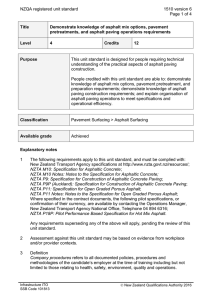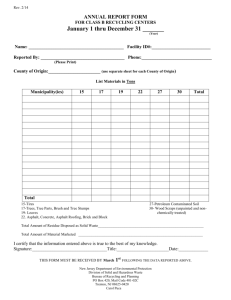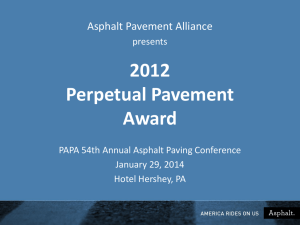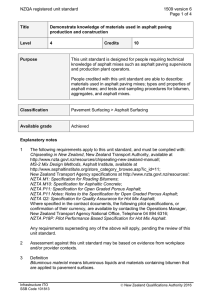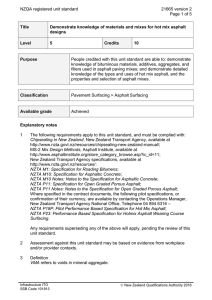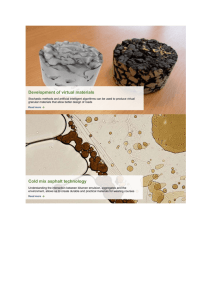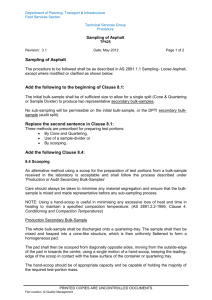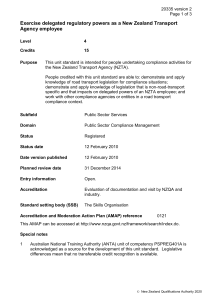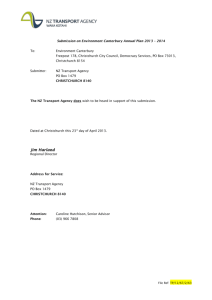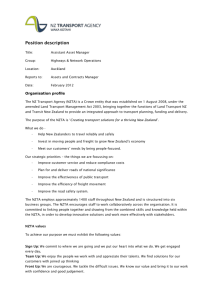73KB - NZQA
advertisement
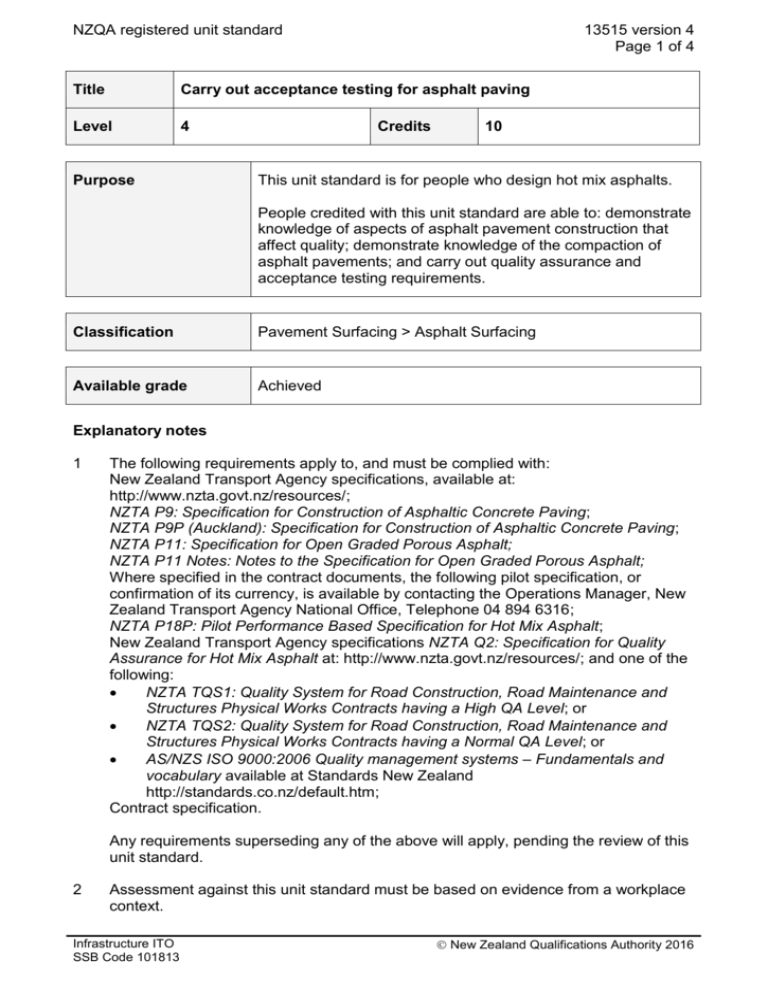
NZQA registered unit standard 13515 version 4 Page 1 of 4 Title Carry out acceptance testing for asphalt paving Level 4 Purpose Credits 10 This unit standard is for people who design hot mix asphalts. People credited with this unit standard are able to: demonstrate knowledge of aspects of asphalt pavement construction that affect quality; demonstrate knowledge of the compaction of asphalt pavements; and carry out quality assurance and acceptance testing requirements. Classification Pavement Surfacing > Asphalt Surfacing Available grade Achieved Explanatory notes 1 The following requirements apply to, and must be complied with: New Zealand Transport Agency specifications, available at: http://www.nzta.govt.nz/resources/; NZTA P9: Specification for Construction of Asphaltic Concrete Paving; NZTA P9P (Auckland): Specification for Construction of Asphaltic Concrete Paving; NZTA P11: Specification for Open Graded Porous Asphalt; NZTA P11 Notes: Notes to the Specification for Open Graded Porous Asphalt; Where specified in the contract documents, the following pilot specification, or confirmation of its currency, is available by contacting the Operations Manager, New Zealand Transport Agency National Office, Telephone 04 894 6316; NZTA P18P: Pilot Performance Based Specification for Hot Mix Asphalt; New Zealand Transport Agency specifications NZTA Q2: Specification for Quality Assurance for Hot Mix Asphalt at: http://www.nzta.govt.nz/resources/; and one of the following: NZTA TQS1: Quality System for Road Construction, Road Maintenance and Structures Physical Works Contracts having a High QA Level; or NZTA TQS2: Quality System for Road Construction, Road Maintenance and Structures Physical Works Contracts having a Normal QA Level; or AS/NZS ISO 9000:2006 Quality management systems – Fundamentals and vocabulary available at Standards New Zealand http://standards.co.nz/default.htm; Contract specification. Any requirements superseding any of the above will apply, pending the review of this unit standard. 2 Assessment against this unit standard must be based on evidence from a workplace context. Infrastructure ITO SSB Code 101813 New Zealand Qualifications Authority 2016 NZQA registered unit standard 13515 version 4 Page 2 of 4 Outcomes and evidence requirements Outcome 1 Demonstrate knowledge of aspects of asphalt pavement construction that affect quality. Evidence requirements 1.1 Surface preparation is described in terms of tack coat, blinding course, membrane seal, and levelling course. 1.2 Minimisation of segregation of asphalt mixes is described in terms of plant loadout, transfer to paving machine, paver feed, and hand work. 1.3 Laying operations are described in terms of plant and sequence. Range plant and sequence includes but is not limited to – loading, transport, paving machine, grader, placement by hand, screed. Outcome 2 Demonstrate knowledge of the compaction of asphalt pavements. Evidence requirements 2.1 Compaction is described in terms of plant and sequence. Range 2.2 Selection of compaction equipment is described in terms of mix type, site conditions, and specification requirements. Range 2.3 pavement shape, geometric constraints, topography, available materials, available equipment, clearances, live load limitations, vibration, layer thickness. Compaction is described in terms of achieving required strength, permeability, and life of an asphalt layer and takes account of site conditions and constraints. Range 2.4 plant includes but is not limited to – static steel roller, rubber-tyred roller, vibrating roller, combination roller. constraints may include – pavement shape, geometric constraints, topography, available materials, available equipment, clearances, live load limitations, vibration, layer thickness. Compaction is described in terms of factors that influence the result. Range Infrastructure ITO SSB Code 101813 factors include but are not limited to – road temperature, ambient temperature, wind, mat thickness, mat temperature, mix type, roller type. New Zealand Qualifications Authority 2016 NZQA registered unit standard 13515 version 4 Page 3 of 4 Outcome 3 Carry out quality assurance and acceptance testing requirements. Evidence requirements 3.1 Quality assurance is described in accordance with NZTA Q2: Specification for Quality Assurance for Hot Mix Asphalt. may include but is not limited to – NZTA TQS1, NZTA TQS2, AS/NZS ISO 9000:2006. Range 3.2 Process control data from asphalt production plant is analysed and evaluated in accordance with company quality assurance system. 3.3 Production testing is carried out in accordance with contract specifications, company quality assurance system, and NZTA Q2: Specification for Quality Assurance for Hot Mix Asphalt. may include but is not limited to – bitumen content, aggregate grading, maximum theoretical specific gravity, moisture content. Range 3.4 Testing of field samples is carried out in accordance with contract specifications, company quality assurance system, and NZTA Q2: Specification for Quality Assurance for Hot Mix Asphalt. 3.5 Acceptance testing of finished pavement layer is carried out in accordance with contract specifications. may include but is not limited to – thickness, in situ air voids, shape, permeability, sand circles, skid resistance, roughness. Range 3.6 Test data is interpreted in accordance with contract specifications and takes into account the inherent limitations of test methods. Planned review date 31 December 2016 Status information and last date for assessment for superseded versions Process Version Date Last Date for Assessment Registration 1 24 March 1998 31 December 2013 Revision 2 5 January 1999 31 December 2013 Review 3 27 October 2005 31 December 2013 Review 4 15 March 2012 N/A Consent and Moderation Requirements (CMR) reference 0101 This CMR can be accessed at http://www.nzqa.govt.nz/framework/search/index.do. Infrastructure ITO SSB Code 101813 New Zealand Qualifications Authority 2016 NZQA registered unit standard 13515 version 4 Page 4 of 4 Please note Providers must be granted consent to assess against standards (accredited) by NZQA, before they can report credits from assessment against unit standards or deliver courses of study leading to that assessment. Industry Training Organisations must be granted consent to assess against standards by NZQA before they can register credits from assessment against unit standards. Providers and Industry Training Organisations, which have been granted consent and which are assessing against unit standards must engage with the moderation system that applies to those standards. Requirements for consent to assess and an outline of the moderation system that applies to this standard are outlined in the Consent and Moderation Requirements (CMR). The CMR also includes useful information about special requirements for organisations wishing to develop education and training programmes, such as minimum qualifications for tutors and assessors, and special resource requirements. Comments on this unit standard Please contact Infrastructure ITO askus@infratrain.co.nz if you wish to suggest changes to the content of this unit standard. Infrastructure ITO SSB Code 101813 New Zealand Qualifications Authority 2016
